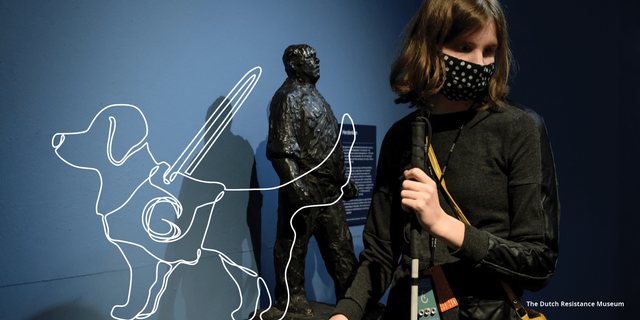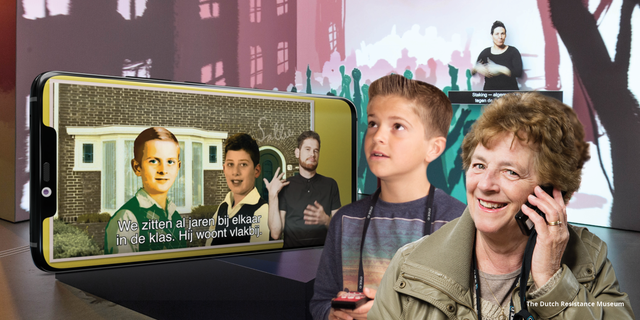The importance of inclusiveness: stories for all
Frits Polman • feb 17, 2022
Inclusiveness has been an important topic for some time, including in the cultural sector. How do you make sure your museum is relevant to as many people as possible? In this article, I’ll show you how Guide-ID enables every visitor to enjoy the story you’re telling.
Removing barriers, discovering stories
For Guide-ID, our platform is our way of making stories accessible. And the more stories told, the better! Whether culture, art, or nature: we give objects and spaces a voice and help people to listen and expand their knowledge. To do this properly, we’ve created the world’s simplest audio guide. It enables visitors to discover stories without any restrictive technologies or unnecessary distractions. And we want all visitors to benefit...
An emotional war veteran
I have vivid memories of the launch of our audio guide on the USS Midway Museum. They still used a system that had visitors dialling numbers to listen to stories. Our point-and-listen system is much more user-friendly, we think. After we had officially launched the audio tour with a whole lot of fanfare (as only Americans can do), a veteran in a wheelchair came to me and, emotionally, said: ‘This was the first time I could hear the voices of my fellow veterans!’ Being paralysed, he was unable to dial the numbers. Over the following days, he went to all the aircraft to listen to everything.
For Guide-ID, our platform is our way of making stories accessible. And the more stories told, the better! Whether culture, art, or nature: we give objects and spaces a voice and help people to listen and expand their knowledge. To do this properly, we’ve created the world’s simplest audio guide. It enables visitors to discover stories without any restrictive technologies or unnecessary distractions. And we want all visitors to benefit...
An emotional war veteran
I have vivid memories of the launch of our audio guide on the USS Midway Museum. They still used a system that had visitors dialling numbers to listen to stories. Our point-and-listen system is much more user-friendly, we think. After we had officially launched the audio tour with a whole lot of fanfare (as only Americans can do), a veteran in a wheelchair came to me and, emotionally, said: ‘This was the first time I could hear the voices of my fellow veterans!’ Being paralysed, he was unable to dial the numbers. Over the following days, he went to all the aircraft to listen to everything.

Audio tours against illiteracy
Another great example of how our audio tours can be more inclusive is a project we launched in a Tanzanian village a few years ago. As many of the residents can’t read or write properly (or can’t read or write at all), they’re unable to access the rich history of their village and surroundings. We wanted to change that. With the help of our audio tour, we’ve given the residents an accessible, easy way to learn more at their own pace!
Nobody is excluded
The age range of museum visitors is between 8 to 88 years old. We developed our Podcatcher with this in mind. A family visiting the museum (let’s say a father and mother, two children, and their grandparents) should all be able to enjoy the story of the museum. Many museums started using smartphone audio tours a few years ago, but that approach effectively excluded young and old visitors. It was anything but inclusive.
Our Podcatcher is so easy to use that everyone can understand and use it immediately, without any hassle. And visitors who want to use their smartphone can do so with our app.
Sign language interpreter for the deaf and hard of hearing
You may be asking yourself: what if granddad is hard of hearing? What use is an audio tour then? Well, our app offers a tour with a sign language interpreter for people who are hard of hearing or deaf. And if granddad doesn’t have a smartphone, he can use dad’s and still enjoy the stories. In the worst-case scenario, museums themselves can always provide some smartphones, so that no one has to miss out on the great stories.
Another great example of how our audio tours can be more inclusive is a project we launched in a Tanzanian village a few years ago. As many of the residents can’t read or write properly (or can’t read or write at all), they’re unable to access the rich history of their village and surroundings. We wanted to change that. With the help of our audio tour, we’ve given the residents an accessible, easy way to learn more at their own pace!
Nobody is excluded
The age range of museum visitors is between 8 to 88 years old. We developed our Podcatcher with this in mind. A family visiting the museum (let’s say a father and mother, two children, and their grandparents) should all be able to enjoy the story of the museum. Many museums started using smartphone audio tours a few years ago, but that approach effectively excluded young and old visitors. It was anything but inclusive.
Our Podcatcher is so easy to use that everyone can understand and use it immediately, without any hassle. And visitors who want to use their smartphone can do so with our app.
Sign language interpreter for the deaf and hard of hearing
You may be asking yourself: what if granddad is hard of hearing? What use is an audio tour then? Well, our app offers a tour with a sign language interpreter for people who are hard of hearing or deaf. And if granddad doesn’t have a smartphone, he can use dad’s and still enjoy the stories. In the worst-case scenario, museums themselves can always provide some smartphones, so that no one has to miss out on the great stories.

A children’s tour for parents?
But will everyone hear the same story? Do those two children have to listen to the same stories as their parents? Not at all. Children want something quick-paced: a quiz, a treasure hunt, an adventure. We can provide this very easily by creating a special children’s tour on our online platform. (Incidentally, our data shows that children’s tours are also popular with many parents.)
Artificial intelligence for translation
I’d also like to say something about the language in which we tell our stories. Many museums around the globe provide information in one language only. But what if you don’t speak that language? Let me put it this way: French and Spanish aren’t my strong points. And yet, these days, it’s so easy to offer the stories you have in every language you can think of. Artificial Intelligence (AI) can provide good-quality translations and convert the text into very listenable (foreign language) voices, so that all your visitors can enjoy the story in their own language. It really doesn’t get any more inclusive than that.
More tolerance thanks to inclusiveness
Inclusiveness is important. Stories are important. They provide a broader view of the world and, I think, lead to more tolerance. That’s why it’s also an important driving force at Guide-ID. We want to share stories with everyone. If you have any ideas on how we can make our platform even more inclusive, please get in touch!
List of Services
-
Business success means getting up more than you fall down. The Netherlands is yet again covered in a blanket of snow. Cue chaos in the media and on the streets. The national weather agency issues the highest weather alert code, and everyone’s on their guard. Nobody wants to slip. But I take a slightly different view: I know how much there is to learn from slipping up – figuratively. Although the time between falling and getting back on your feet can be quite painful, these are the moments that provide the most valuable lessons.Read More → Business success means getting up more than you fall down.
-
Building inclusive visitor experiences, where to start? At Guide-ID it’s in our DNA to help our clients tell their stories. Audio guides can open up your museum and make it accessible to all, in ways that you may not yet have considered. Here, we’d like to share with you how we can help you become more inclusive, using the options our audio guides have to offer. Let’s start by sharing the first step towards ‘all-inclusive’ storytelling. When creating an audio guide, start by asking yourself these three easy questions: who, what, where?Read More → Building inclusive visitor experiences, where to start?
-
Enrich your content with a diversity of perspectives. Connect to your audience by 'speaking their language' in audio tour content. I believe that museums are the mirrors of our society. This is because the collections they display and stories they tell appeal to a diverse audience. When I embarked on my career in the museum sector over 20 years ago, educational services were a hot topic. Museums had begun organizing guided tours and workshops for schools and groups, and placed labels and texts for individual visitors (although these were still often written in technical jargon). This was the point at which museums became even more accessible – you no longer had to be an art expert to understand what an exhibition was about.Read More → Enrich your content with a diversity of perspectives. Connect to your audience by 'speaking their language' in audio tour content.
-
The In Flanders Fields Museum comes back to life It certainly felt good to see a sign reading ‘FULLY BOOKED’ outside a museum. The In Flanders Fields Museum (IFFM), like many other Belgian museums, sold out during the Easter holidays. The weather and the Belgian travel ban undoubtedly made a difference. Museums, including the IFFM, remarked that many visitors were people who would not normally visit museums.Read More → The In Flanders Fields Museum comes back to life
-
Customer-driven development - How we use co-creation to optimize our products. At Guide-ID, we’re passionate about technology and culture. Combine these two to create the perfect job. Since 2009, our creative team’s passion – and increasing customer collaboration – has driven constant improvements to the Podcatcher platform.Read More → Customer-driven development - How we use co-creation to optimize our products.
-
On your marks, get set, go! Yes! We finally seem to have turned the corner. Museums can reopen their doors in increasing numbers of countries. Visitors can barely wait to visit museums once more, and Guide-ID is ready to share stories with them once more. During the pandemic, we worked to make our entire platform easier to use for existing and new customers. In this blog, I will explain why we are truly worthy of the title ‘world’s easiest audio guide’.Read More → On your marks, get set, go!
Contact
Leeuwenbrug 117
7411 TH Deventer
The Netherlands
BE: 0800 45 009
UK: +44 (0)20 338 468 38
US: +1 (347) 523 8619